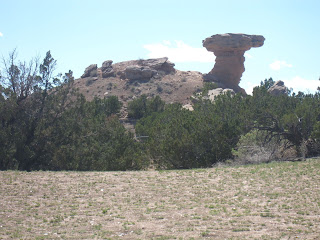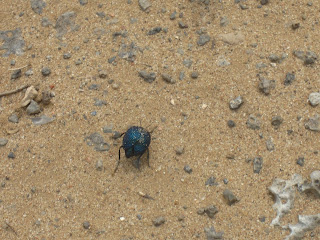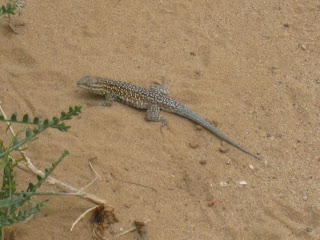April, 2012
MindyMania 2012: The Wild Aftermath
Okay, this is supposed to be a Mathematical Monday, but hey—I worked the word “math” into the title.
As I mentioned on Friday, Mindy McGinnis (critique partner extraordinaire) came to visit for the weekend. The three presentations at my school Friday were awesome. More on that Wednesday. Today, I’ll talk about wildlife.
After school, we saw a camel. Well, sort of. We went to Camel Rock.
See? Totally looks like a camel, right?
On Saturday, we went out to Petroglyphs National Monument. I’ll share some pictures of the actual petroglyphs on Friday, but I said this was about wildlife. Here’s a bug we saw as we were hiking.
Can anyone tell me what kind of bug it is? It was a quick little thing, so I’m pretty impressed with the picture I managed.
Later on, during the hike back, we saw this lizard. Not at all uncommon for me—I see them all the time outside my apartment complex—but not an everyday thing for Mindy. Unlike the mystery bug, this guy was happy to stand and pose for us as long as we didn’t step any closer. Hooray for camera zoom!
After Petroglyphs, we went to a very particular Twisters restaurant. That’s a burger/burrito chain around here. No big deal, except this specific location was featured prominently in a season of the TV series Breaking Bad, which Mindy is a fan of. We weren’t expecting more wildlife, but in the lot next door, we saw an emu.
Yes, an emu.
Seriously.
Sunday didn’t involve any wildlife, except for the angry passengers from Mindy’s cancelled flight. Don’t worry. She (hopefully) made it safely away this morning and will either be on her way home or there by the time you read this.
More to come the rest of this week.
Speak up:
3 commentsPeople on the Internet are Scary! (No, They’re Not)
You know how they say to be careful with people you meet on the internet? How they might not be who they say they are? Maybe they’re scary and strange?
Apparently I’m allowed to throw that advice out the window under the right circumstances.
The illustrious Mindy McGinnis safely arrived in the dusty, dirty, just-plain-BROWN southwest today. (Seriously. Mega-winds kicking up the dirt creating a cloud of brown over the city.) We’ve known each other (on the internet) for about two and a half years. We’ve been critique partners (on the internet) for about a year and a half. Today we met in person for the first time.
People knew this was happening. No one thought it was weird or scary.
Maybe it’s because of how ubiquitous the internet is now, how big social media has become, or maybe it’s just that Mindy and I have known each other in online arenas that are public enough to validate our identities. Or something.
At any rate …
Today she’s the guest author at my school’s second biannual Author Illustrator Competition. Not only is this her first visit anywhere in the west that isn’t Las Vegas, it’s also her first foray into Deaf-World.
Should be fun.
I’ll be sure to report back.
Speak up:
8 commentsPrescriptive vs. Descriptive Grammar
These are terms I learned in a linguistics class in grad school. If you’re not familiar, here are the quick-and-dirty definitions.
Prescriptive grammar is grammar according to the super-official grammar books.
Descriptive grammar is how people actually talk.
Of course, language is always evolving, and often the changes come because something in the realm of descriptive grammar becomes so common and pervasive, it overwrites the prior rule in the prescriptive grammar books.
In certain arenas, it’s appropriate to follow prescriptive grammar rules to the letter. When writing fiction, it’s not so clear-cut. There’s also voice to consider. Dialogue in particular gets a little more leeway when it comes to grammar.
Once in a while, though, something comes along that can’t be explained away by voice, and yet I can’t bring myself to write it the “proper” way because my gut says we’re on the verge of overwriting the rule. (Or at the least, my gut says people who talk that way in real life are a critically endangered species.)
For example, in my current project, I have a character say, “It is her.” (The sense is, “She is the one we’re looking for.”)
Gerty Grammarian says it should be, “It is she.” In the particular situation, it makes sense that the character would be fairly educated and would probably speak in a proper manner.
But I can’t bring myself to write it that way. It just feels too wrong.
In a situation later in the story, a similar line came up, and in that case I did change it. I wanted that particular character to be over-the-top formal, so it made sense to me. It felt right.
How about you? Do you have any little gems of grammar that you know are “correct” one way, but you just can’t bring yourself to write it that way?
Speak up:
8 commentsEarth: By the Numbers
Yesterday was Earth Day, and today is Mathematical Monday, so I figured I’d put the two together with some stats on this planet of ours.
- The diameter of Earth is about 7,920 miles. That’s nearly 140,000 football fields. If it were possible to drive at highway speeds (say, 75 mph) through the planet, it would take nearly 4.5 days to reach the other side.
- The mass of Earth is about 6 septillion kilograms. (That’s 6 followed by 24 zeroes. I’m going by the U.S. definition of the word—apparently it’s different in the U.K.) That’s about the same as 165 quintillion empty 18-wheelers. Or the Empire State Building 16,000,000,000,000,000,000 times over.
- The volume of water on Earth is about 1.5 billion cubic kilometers. That’s about 600 trillion Olympic swimming pools. (I think. I don’t have my preferred calculators handy.) 97% of that is saltwater in the oceans.
- So, Earth is pretty big. But if our sun were empty, it could fit over 1,000,000 Earths inside.
Now, while you ponder that massiveness, check out this very cool view of the planet from orbit.
Speak up:
Comments Off on Earth: By the NumbersThe Undefinable, Undeniable Teen
What are teenagers like?
Don’t answer that. No matter what you say, you’re wrong. Unless you say something like, “Depends on the teen,” or, “As varied as adults, toddlers, senior citizens, or anything else.” Those are cop-outs anyway.
Teens (like so many other groups) get a lot of generalizations applied to them. Like every other generalization or stereotype, you can point to textbook cases where they’re true, and often just as many where they’re utterly false.
Example: Teens are irresponsible.
If we’re judging based on how some of them drive, then absolutely. On the other hand, I know teens who budget their money, make sure to take their car in for regular oil changes, and warn me two weeks in advance that they’ll be missing school and need their homework.
The whole essence of “teenager” is that it’s this amorphous time between childhood and adulthood where they have several traits of both stages at the same time … and those traits are often in flux from one moment to the next.
This is on my mind today because of a particular pet peeve of mine—talking to teens like they’re little kids.
I can’t fathom how common this is in schools. Not like all teachers do it, or even most, but enough to puzzle me. I’ve often wondered—but have never had the guts to ask one of the perpetrators—why they talk to students as they do. They’re not rude or anything. It’s just this tone and approach to interacting with students that I know would drive me bonkers if I were a teen.
Do they really regard teenagers as roughly the same as elementary students? I don’t know.
I can’t say I treat students exactly the same as I treat adults, or even talk to them exactly the same way. But it’s close. I try to acknowledge that they’re in that transition, which means they’re partway adult, but still in flux.
Maybe this attitude in teaching has informed my writing, because I try really hard to never talk down (write down?) to my audience.
And maybe that consciousness is why that “I’m talking like you’re nine years old” tone drives me nuts.
Speak up:
2 commentsAn Undeserved Rant, Perhaps
Lots of people have been getting good news lately—yay, good news! But in the congratulations, I’ve seen the following phrase come up a lot:
You deserve it.
This kept standing out to me, and it got me thinking. What does it mean to “deserve” something?
Okay, I know what it means. Somehow by our character or actions, we qualify to receive whatever we’ve gotten. But it kept bugging me.
In ASL, we generally use the same sign for “deserve” and “earn,” and in a lot of cases, they feel pretty interchangeable. So why does something tell me they’re not the same thing this situation? Maybe it’s this:
What does not getting it mean?
If some particular good-thing hasn’t happened for me, does that mean I don’t deserve it? (And of course, this doesn’t just go for me, but anyone who hasn’t gotten whatever that good-thing is.) Please don’t say that’s true, because I’m plenty good at beating up on myself already. 😉
Or then there’s this:
What if someone doesn’t deserve it but gets it anyway?
Clearly if there’s any real meaning to “deserving” anything, it’s possible to be undeserving. So if there are people who deserve but don’t get, there are likely people who get but don’t deserve.
But what does any of that mean? And how does anyone decide? What is it based on?
What’s the point of saying it? Maybe everyone deserves everything, or no one deserves anything. Either way, the statement feels empty to me.
Personally, I’m going to stick to the following:
Congratulations.
Or something along those lines. Because maybe they deserve it, maybe they don’t, but it doesn’t matter. They got it.
Whatever “it” is. 🙂



